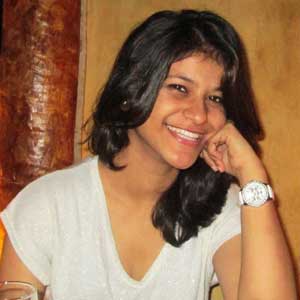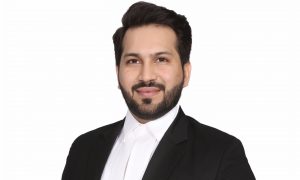 Sanyukta Banerjie is a 2014 Batch graduate of Gujarat National Law University, currently pursuing her LL.M from NUS, Singapore. She has been one of the brightest students at GNLU and has actively participated in theatre and music during her college life. In this interview with Superlawyer, she shares her passion for IPR and teaching and the various considerations one should keep in mind while applying for a Masters Degree.
Sanyukta Banerjie is a 2014 Batch graduate of Gujarat National Law University, currently pursuing her LL.M from NUS, Singapore. She has been one of the brightest students at GNLU and has actively participated in theatre and music during her college life. In this interview with Superlawyer, she shares her passion for IPR and teaching and the various considerations one should keep in mind while applying for a Masters Degree.
How would you introduce yourself to our readers who are mostly young students of law and lawyers?
I would introduce myself as a student of law as I believe what we study in law school, or learn over internships or even on the job is really just a fraction of the expertise that is required. As cliché as it sounds, the study of law really is a life-long journey.
Please tell us a little bit about your childhood and your background? Why did you decide to pursue law and what affected your decision?
My childhood was spent more among books than people. In fact I remember my Mum would send me off to play with the neighbourhood kids and I would instead sidle into their rooms and pore over their collection of Pinkie, Chacha Chaudhary, Enid Blyton, etc. Come to think of it, I might have come across as a bit of a prig! Reading led to writing and coupled with the fact that I usually had an opinion on almost everything, law seemed the inevitable choice. I can’t exactly pinpoint when I had that moment of epiphany so to say, but I do think my fascination with law started because at that stage of my life, and being part of the education system that I was in, law was the only medium which permitted me and in fact encouraged me to question all that I saw around me.
Tell us a bit about your life in law school. What activities were you involved in apart from the regular academic curriculum?
Oh law school! Well, I think I tried my hand at almost everything once (Except sports. Everlasting anathema). I think that’s the best part of law school, or perhaps the times we live in. Every activity is so democratically organized that even if you have a fledgling of an interest in anything, there would a club for it and people as enthusiastic as you, if not more, to share that interest with you. I was part of the Theatre Club, the Music Club and the Quizzing Club. I enjoyed mooting and writing. (Even if it be just academic papers, as nerdy as that sounds.)
Any fond memories which you would want to share with our readers related to your days in law school?
Haha! This question makes me feel so old. I don’t know if it’s just me but law school has you living this strange dichotomous life where your superiority complex is matched only by your self-loathing. Anyway, 2012 for me was the year of a particularly high degree of self-directed hate. But in March we stood runners up at a moot court competition and I was adjudged the best oralist which helped me put things in perspective and calmed me down immensely (only for it to start all over again next year!)
As a law school student you have done a number of internships. Please tell us a bit about them and how they helped shaping up your future career prospects.
As depressing as it might sound to certain people depending upon their private beliefs, most fundas about law school internships are actually quite accurate. Yes, interning at a place does spike your chances of securing a job there. No, it does not matter how you secured that internship or what your grades were. And yes, the nature of the beast demands a fair amount of hobnobbing and that includes both corporate and litigation sectors. Since I was still finding my feet career-wise when I came to law school, I went step by step. So I interned with NGOs, litigation practises and law firms and I am really glad for having sampled each of these avenues. I think they helped me define my ideas about a career vis-à-vis work culture, office environment and quality of work in a manner that reading about them or asking my seniors never would have.
Even though my ultimate aim is to teach in India, I will always be glad to have picked up such work experience along the way because when I was pursuing undergraduate studies, I remember that those teachers who had prior experiences working in legal institutions had a sounder understanding of their subject.
When and why did you decide to pursue an LL.M and what were the considerations you had in mind while looking at various universities? What was your motivation behind doing an LL.M. abroad? Why not an LL.M. in India?
My wish to teach lay at the core of my intention to pursue an LL.M. I was in my last year, had vetted almost every avenue of law through internships and quite exasperatingly, I had enjoyed all of them. As you can imagine this did not particularly ease decision-making with respect to picking a career. My college conducts an ASP (Academic Support Program) program where seniors provide remedial classes on any subject of their choice/expertise. I used to volunteer for that program and would occasionally take classes. Apart from that sometimes our curricular assignments required us to conduct presentations on a particular topic in class. And I remember all along…how do I put this? I remember just being very happy doing it. Standing before a class of forty odd students and attempting to tell them about a topic in a way that would make them engage and learn; to me was a tremendously exciting proposition. I don’t know about all that found-my-calling business but I know that teaching, in any capacity, makes me happy.
Like any other Indian kid, I wanted my decision to receive the blessings of my parents. They were onboard with it, but my Mum insisted I pursue an LL.M outside India. What I had not completely grasped at that point, but do realize now, is that an LL.M abroad really is an educational sea-change. I have not had the opportunity of pursuing an LL.M in India but I can certify to this that an LL.M abroad (from a reputed institution albeit) really does put the ‘masters’ in the Master of Laws degree.
Given the Rupee-Dollar exchange rate, it is quite costly to do masters from a foreign country. How did this factor influence your decision?
For me, pursuing an LL.M abroad (in the absence of a scholarship) was treading a tightrope between pursuing economy and checking college credentials. So that necessarily ruled out an education in America even though some of the IPR courses there are really good. Ultimately it came down to UK or Singapore. But at that point of time UK with its immigration policy post 2010 and the more theoretical tone of its IP course, fell short. Additionally factoring in the comparative cost benefit analysis, I opted for Singapore.
What were your areas of interest while you were an undergraduate student and how have they helped in choosing your subjects/courses for the LL.M programme?
Owing perhaps to the dynamic nature of the subject and the excellence of the teacher (Dr. William Nunes), my areas of interest had been Political Science and International Relations. Then the moot happened and I found the love of my academic life – IPR. It’s worked perfectly for me, because IPR with its WIPO origins is a subject that requires an international perspective for a comprehensive interpretation and an LL.M with a specialization in IPR provides me with that.
Tell us about your days at NUS? How rigorous is the academic schedule?
Rigorous! You can say that again and then underscore it. Whoever refers to an LL.M degree abroad as a one-year vacation is either a crazy genius or needs to get his or her head examined! A compact one year course means a year of continuous information overload and there is no way you can cheat the system. There really isn’t. On the other hand if you pick a subject that you like (and that’s usually an option with LL.M) then NUS is the best place to be. The professors really push you but all in a really clever underhand way that makes you feel like crap anytime you slack.
How is the Indian fraternity over there? Were there many Indian students?
Well I have met some really friendly, intelligent and fun people. But the way I see, if you go in with an open mind, then you are bound to meet all kinds of interesting people which I am lucky to say I have. The majority students are naturally Singaporean, followed by Chinese and then Indian. Although in terms of diaspora, depending upon the electives, the class composition completely changes.
How does one go about the scholarships? Does the institute offer any scholarship? What are the key scholarships one should look for?
Depending upon the specialization that one’s opting for, the university does offer scholarships. For example, in case of IPR there is the Ella Cheong Intellectual Property Scholarship which is merit based and all LL.M applications are automatically vetted for it at the stage of admission. Apart from that the NUS official website has a page entirely dedicated to listing scholarships that a prospective student can look into before applying, as and when something comes up. My humble two cents on procuring a scholarship – plan ahead and have obscenely good academic records because it is quite competitive.
What about extra-curricular activities and your hobbies at NUS?
Postgrad for me is a complete volte face; which is code for zero extra-curricular activities. Although, as dorky as it might make me sound I love attending conferences! I really do. Mostly they are on topics that have nothing to do with my electives. It’s such a welcome break from the routine sometimes! For one, I don’t have to do any preparatory reading, so I just pop in, listen to these really amazing experts and come away with a way more nuanced understanding of a topic than the standard Wikipedia entry on it. It’s like trivia surfing but for the non-virtual world – time flies and it gets addictive real quick!
Tell us a bit about the difference in studying at NUS and at GNLU.
Well the most observable difference for me was in terms of the student-teacher equation. Partly due to the culture and perhaps owing to a certain amount of independence that pursing a postgraduate degree permits, the structure is a lot less hierarchical. The lack of any obvious duress on part of teachers makes students feel more in control and thereby more liable for their academic result. So naturally they apply themselves more.
Going forward, how do you expect the LL.M experience to influence your career?
For someone who plans on teaching law in the future, I can already sense the way this course has changed my perspective on law as well as on teaching. In spite of the wide-ranging content of this course, I constantly feel like I have so much more to learn. I think that’s always a good takeaway for anyone who plans on imparting education in such a dynamic field as law.
Any suggestions which you would want to give for students wanting to pursue higher studies abroad?
I would suggest them to start REALLY early. So whether it is gathering material, researching on prospective colleges, preparing their statements of motivation, arranging for scholarships or procuring letters of recommendation, just start already. You won’t even realize but just getting into the process gives you such clarity of vision with respect to what you want out of an LL.M degree or if you want one at all.


























